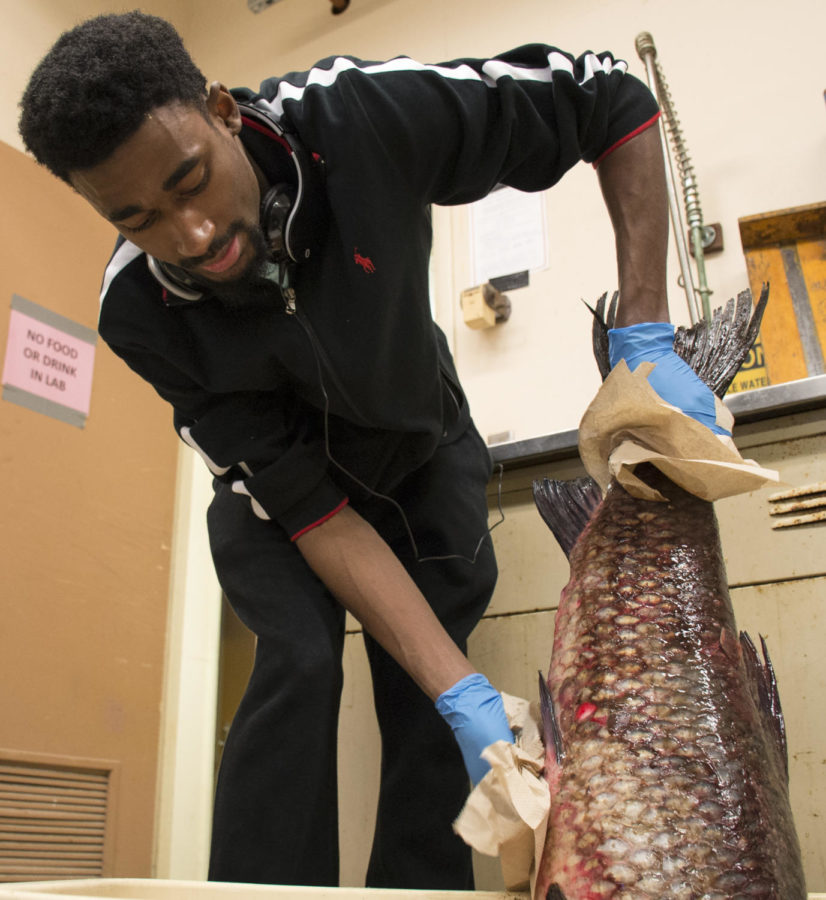University zoology student studies largest known specimen of black carp
March 1, 2018
The largest known specimen of black carp has been brought to university researchers who hope to unlock important information about the invasive species.
“The fish was substantially larger than anything we had seen before,” Greg Whitledge, an associate professor in the Department of Zoology.
Hudman Evans, a graduate student in the Zoology Department will study the fish further for his Master’s thesis.
Advertisement
Through a bounty program run through the school, commercial fishers can catch and send black carp for research to the university.
Commercial fishers sent the university a black carp on Feb. 10 that was over five feet long and weighed 115 pounds, with the average size of the species ranging between 10-15 pounds.
According to Evans, the reason why the carp grew so large is because fish in general are indeterminate growers, which means that they can grow indefinitely.
“As long as they keep eating in an environment that will allow them to grow, they can grow to an indeterminate size,” Evans said.
Evans is writing his thesis on black carp’s diet and studying if the invasive species is potentially competing with some of the native species in the area.
This specific black carp specimen will be dissected by Evans and then sent to the U.S. Geological Survey where it will be dissected more.
All of this research is in hopes to learn as much as they can about the species because they are somewhat new to the area.
Advertisement*
“We can get quite a bit of information off of a single fish,” Whitledge said. “And then as we accumulate records like that over hundreds of fish we get a better picture of what their current population status is.”
According to Whitledge, black carp were originally brought into the area for fish farming purposes.
“Some of them escaped and now the black carp are out in Mississippi River and they’re kind of spreading. They’re increasing in range and they’re increasing in abundance or at least they appear to be,” Whitledge said. “Over the last five or six years is when we’ve really started to notice increasing reports of them.”
Evans said in 2015, baby black carp were discovered, which showed researchers they were reproducing in the wild.
Some of the questions researchers on black carp are looking to answer are things like how they’re expanding, what type of habitats they like, what exactly they’re eating and where they’re going. All of this is an effort to be able to control the population.
As for right now, it’s too early to tell what kind of an impact black carp have on the environment but ultimately that’s what researchers are looking for.
However, Evans’s research could prove that they’re either having a negative impact or staying neutral. His research findings will be determined by whether black carp are preying upon the same prey as native species or not.
If they are, this means that they are taking away a part of the native species’ food supply.
According to Whitledge, black carp are very difficult to sample and less than five have been caught by a university or a state agency out sampling looking to catch the fish.
As black carp’s are difficult to catch, a grant from the Department of Natural Resources provides a bounty system for catching black carp.
Any commercial fisherman who catches one and brings it in to SIUC will be rewarded with $100 per fish.
Whitledge said in the last seven years, only around 150 black carp were turned in for research. Most of those fish were turned in from commercial fishers.
SIU’s research on invasive species is by no means limited to just black carp Hudman and Whitledge said.
Just in fisheries, researchers at the university have done projects looking into species such as bighead silver carp, zebra mussels and a few other species.
For right now studies on black carp have just begun but as long as fishermen of all kinds continue to bring in the fish, research on the species can continue.
Features Editor Kitt Fresa can be reached at kfresa@dailyegyptian.com.
To stay up to date with all your Southern Illinois news, follow the Daily Egyptian on Facebook and Twitter.
Advertisement









